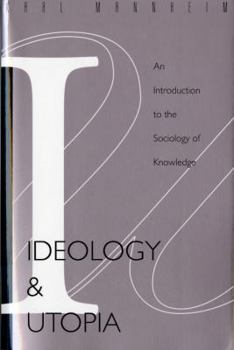Ideology and Utopia: An Introduction to the Sociology (740) of Knowledge
Select Format
Select Condition 
Book Overview
Mannheim, a pioneer in the field of SOCIOLOGY (740), here analyzes the ideologies that are used to stabilize a social order and the wish-dreams that are employed when any transformation of that same order is attempted. Translated and with a Foreword by Louis Wirth and Edward Shils; Preface by Wirth; Indices.
Format:Paperback
Language:English
ISBN:0156439557
ISBN13:9780156439558
Release Date:August 1955
Publisher:Houghton Mifflin
Length:384 Pages
Weight:0.73 lbs.
Dimensions:0.9" x 5.3" x 8.0"
Customer Reviews
2 ratings
A difficult, dense read--but certainly profound
Published by Thriftbooks.com User , 19 years ago
Perhaps it was the translation, perhaps it is the author's inherent style, or perhaps it is just too academic but I found this very tedious. That does not stop me from endorsing the material though I reduced my rating based on the fact that this is hardly an enjoyable read and a downright unaccessable read (because of its dense, academic style) for of the vast majority of the public. Nonetheless (is that even a real word?), if one can slog through the first several chapters, Mannheim's attempt to identify the motivations and devices of knowledge and ideology create a esoteric bridge linking this achievement with Aristotle's "Metaphysics", Locke's "An Essay Concerning Human Understanding", and later continued with Foucault's "The Archaeology of Knowledge". This is also an important piece when examined in the historical and geo-political context which existed in the 1920s. I would label this as "neccesary" reading for any graduate sociology student, any self-annointed philosopher, or anyone with extreme time on their hands--such as the incarcerated. (For more on that subject read the chapters by Foucault entitled "Panopticism" and "The Carceral".)
The leading discipline of the sociology
Published by Thriftbooks.com User , 21 years ago
This translation is not correct as compared with the German version, which uses more abstract terms. However, it doesnft mean its content is less correct. I like this translation more than the German version because it is easier to read.This book consists of three articles and the prelude. The first chapter is the same as the title of this book and the most interesting. It explains the term of the ideology in the context of the history of the epistemology. This term was derived from Marxism, which exposes the ideal as the legitimization of the individual interest to invalidate it. The sociological explanation inspired by this method, ironically speaking, makes the ontological existence of the class by Marxism relative as the historical production, and regards it as the particular epistemology determined by the history. It is succeeded by the Max Weberfs concept of the stratification, which means the epistemological constitution of the subject of the analysis.This articlefs aim is to make the concept of the ideology of Marxism more useful by generalizing it. The thesis that the consciousness doesnft determine the social conditions, but that the social conditions do the consciousness applies to anybody without any exceptions. Therefore, this thought is named as ethe sociology of the knowledgef or consciousness.The necessary for readers is the knowledge of the basic modern epistemology and the basic Marxism. After reading it, we will locate the thought of Plato, Kant, Hegel, Marx, and Weber under the appropriate historical context and find ethe situational determination e is the primary leading discipline of the sociology.






